UNH Undergraduate Research Opportunities
What are some UNH undergraduate research opportunities? What will I learn through undergraduate research?
Torin Scalora '25, an environmental sciences: ecosystems major, received a Summer Undergraduate Research Fellowship (SURF) to research microbial communities in permafrost cores. Discover more about what he learned from the experience and how he prepared to present his research at the UNH Undergraduate Research Conference.
learn more about undergraduate research at UNH
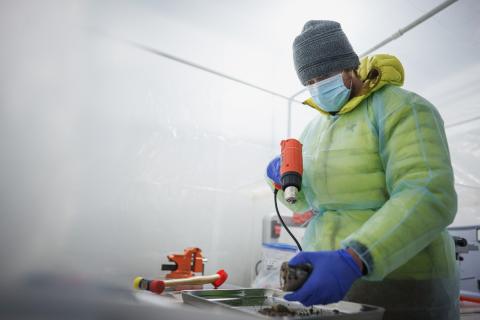
Conducting research on permafrost microbial communities
What is your research about?
My research investigated the ways that depth and salinity structure microbial communities in three 30-meter deep permafrost cores, with each core being a different type of permafrost (subsea, brackish and terrestrial). Research on permafrost microbial communities this deep beneath the surface is relatively novel because of the difficulty in extracting permafrost cores deeper than a meter or two. This research was funded by a UNH Summer Undergraduate Research Fellowship (SURF).
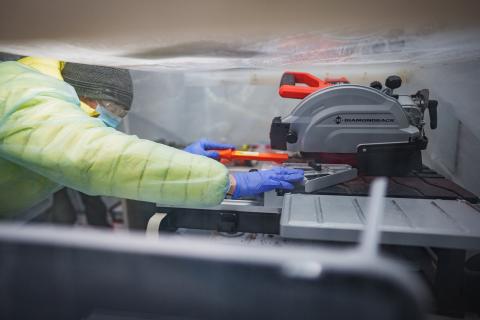
Conducting research on permafrost microbial communities
What did you learn by conducting research?
I learned quite a bit about both the topic and the research process. I expanded my understanding of permafrost formation and classifications, the importance of various environmental factors such as pH and total organic carbon on community composition and the importance of permafrost in the global carbon cycle. The biggest takeaway from this research was seeing how a research project is conducted from start to finish. I hope to keep researching permafrost soils and microbial communities, so learning about the whole research process was eye-opening. Learning how to put together an effective proposal, troubleshoot problems as they arise, analyze data and present findings so early in my scientific career was challenging, but it also gave me a strong foundation that I’ll carry forward.
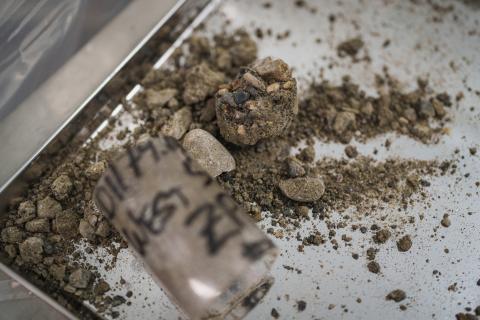
Conducting research on permafrost microbial communities
What was the best part of your research project?
The best part of this project was how much I learned throughout the entire process. I learned something new at every stage, from reading countless papers and designing the study to analyzing the data and presenting it at the American Geophysical Union Annual Meeting. At times, it felt quite challenging to absorb the critical information required to move forward, but these challenges have made me a more effective researcher and more passionate about my work.
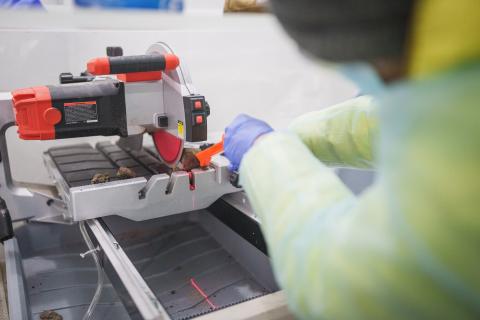
Conducting research on permafrost microbial communities
What was the most challenging part of your research project?
The most challenging aspect was managing logistics and lab work. Coordinating equipment usage, learning lab protocols, processing samples and maintaining a tight schedule took a lot of patience and problem-solving. I often think back to these challenges in class now. While it was difficult, working through those obstacles has already proven to be invaluable.
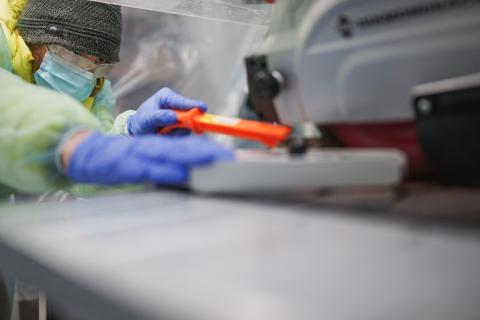
Conducting research on permafrost microbial communities
How did you prepare to present your research?
Preparing to present this project meant revisiting key papers that helped formulate questions and design the study. I worked closely with others in the Ernakovich lab, headed by associate professor Jessica Ernakovich, to ensure the presentation was clear and concise and included all necessary information. I also practiced my presentation with my girlfriend, which helped me refine my delivery and remove jargon that others may not be familiar with.
What’s next for you?
I am still working with the data collected during this fellowship and hope to publish the results if possible. After graduating this semester, I plan to attend graduate school and continue studying permafrost and soil microbial communities. This project deepened my interest in extreme environments and how organisms survive in them. It feels natural for me to keep exploring these systems and investigate microbial interactions with elemental cycles, how life persists in harsh conditions and how the Arctic is responding to a rapidly warming climate.
learn more about undergraduate research at UNH
related posts:
5 Questions with a UNH English Major
How do you choose your major? How do you balance classes and a social life in college? Meet Chloe Best '25, an English major and Spanish minor. read more about Chloe